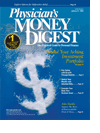PRN: Readers' Digest
Reviewing some of my past columns,I've noticed that I sometimes functionas a reading service, boiling someinteresting facts and factoids down foreasy consumption. That's okay, it's all inthe public interest. And didn't somewag say that all news reduces to eitheran "oops"or a "wow?"There is a placefor in-depth analysis and opinion, andthere is also a place for a quick scan.What follows is the latter—personalfinance lite.
•A couple of recent studies con-firmed what we might have suspected.In the past 19 years, the average equityinvestor earned just 2.57%, the averagemutual fund earned about 3%, and theS&P 500 returned 12.22%. The summarypolitely called the difference the"investor behavior penalty."
•About 62% of Americans say thatthey would prefer a universal healthcare system to whatever you want tocall the one we have now. Want to betthe same number would say so if weactually had such a system?
•The author William Bernstein, MD,says, "The riskiest moment in yourinvesting life is when you are right."
•I was surprised to read that thebest-performing stock in the history ofthe S&P 500 is Phillip Morris, nowAltria. An investment of $1000 in anindex fund in 1957 would have broughtyou $125,000 by 2003—a pretty goodreturn. But an investment in PhillipMorris would have brought you a staggering$4.6 million. I guess sin andaddiction pay.
•Historically, most mergers of bigcompanies have not benefited investors.Management has almost alwaysunderestimated the cost of meshingtwo disparate organizations, whileoverestimating the synergies or cost-savings.Oddly enough, for top managementpros anyway, they almostalways overpay when they buy anothercompany. It's not their money, after all,and you can bet that their generousseverances are always covered.
•Few initial public offerings havemade any money in the long run, especiallyafter the 6-month lockup periodexpires when the founders can cash outand dilute the share price. That's whythere is so much pressure and questionablepractice to get in on that firstoffering day's pop in prices.
•Why do you give to charity?Surveys say that for 60% of us, it is simplybecause we were asked. And if wegive when asked, we give 75% morethan if we initiate the gift ourselves.
•Someone figured out what youwould save if you drove one of thosehot-selling hybrids instead of an expensive,gas-swilling sport utility vehiclethat we see clogging our roads. Over 20years, figuring in gas, insurance, lowerpurchase price, and a reasonable returnon the invested difference, you mightend up $300,000 ahead. At that point,who knows, you might be able to buy aRolls-Royce for your retirement.
•US government bonds virtuallynever default; municipal bonds do so ata 1% rate; and high-grade corporatebonds fail only about 2% of the time.
•On Wall Street, sometimes peoplebuy a stock after bad news, figuringthat the market has overreacted andthey can make money as the stockcomes back up. But they forget that infinancial markets, bad news often travelsin bunches. That's why this practiceis wryly called catching a falling knife.
•Wealth is a form of hoarding. It'sinsurance, if you will, against unpredictabilityof earning ability and purchasingpower. It isn't about how much youhave; it's about what you can buy with it.
•Pessimists, by self-definition, arerarely disappointed, but that's not ahappy way to live. The majority of us tacitlyearn, save, invest, and spend witheternal hope. Not to be pessimistic, butwe really don't have a choice.
a practicing
physician who is a partner on
the Stanford University Graduate
School of Business Alumni Consulting
Team, teaches in the Stanford
School of Medicine Family
Practice Program. He welcomes questions or
comments at jeffebrownmd@aol.com.
Jeff Brown, MD, CPE,
